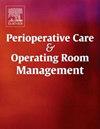Assessment of the patients’ knowledge undergoing surgery about anesthesiology and anesthesiologists’ roles
IF 1
Q2 Nursing
Perioperative Care and Operating Room Management
Pub Date : 2025-01-31
DOI:10.1016/j.pcorm.2025.100480
引用次数: 0
Abstract
Introduction
We aim to assess patients' understanding of anesthesia and the anesthesiologist's role in pre-, intra, and post-operative periods. Anesthesiologists' responsibilities have expanded beyond the operating room to include trauma centers, labor analgesia, resuscitation units, etc. This is particularly important as patients in developing countries often have limited knowledge about anesthesia.
Methods
This cross-sectional study was conducted on 170 patients from January to February 2021 at Faghihi Hospital, affiliated with Shiraz University of Medical Sciences. Consenting patients were interviewed based on a pre-designed and pre-tested checklist.
Results
Out of 170 patients with an age of 46 ± 12 years, 85 % had previous exposure to anesthesia. 93 % of patients thought anesthesia meant to sleep, while only 66 % knew it was a medical specialty, and 24 % were aware of postoperative pain control by an anesthesiologist. Education level was the most important factor influencing patient knowledge, followed by place of residence and previous anesthesia experience. Previous anesthesia experience did not affect opinions about anesthesia (P = 0.15).
Conclusion
The study participants generally had poor knowledge about anesthesia and anesthesiologists' responsibilities. To improve this, we must endeavor to educate patients in the field of anesthesia. Also, attention should be focused on finding ways to inform patients about anesthesiology in rural areas and unschooled patients with video/audio instructions, as our findings indicate that a patient's place of residence influences their knowledge about anesthesiology.
手术患者麻醉知识及麻醉医师角色的评估
我们的目的是评估患者对麻醉的理解以及麻醉医师在术前、术中和术后的作用。麻醉师的职责已经从手术室扩展到包括创伤中心、分娩镇痛、复苏单位等。这一点尤其重要,因为发展中国家的患者通常对麻醉的了解有限。方法对设拉子医科大学附属Faghihi医院2021年1 - 2月收治的170例患者进行横断面研究。根据预先设计和预先测试的检查表对同意的患者进行访谈。结果170例患者(46±12岁)有麻醉史,85%有麻醉史。93%的患者认为麻醉意味着睡眠,而只有66%的患者知道这是一项医学专业,24%的患者知道麻醉师对术后疼痛的控制。文化程度是影响患者麻醉知识的最重要因素,其次是居住地和既往麻醉经验。既往麻醉经验不影响对麻醉的评价(P = 0.15)。结论研究对象对麻醉及麻醉医师职责的认识普遍较差。为了改善这一点,我们必须努力在麻醉领域对患者进行教育。此外,我们的研究结果表明,患者的居住地会影响他们对麻醉学的了解,因此,应将注意力集中在寻找方法,通过视频/音频指导,向农村地区的患者和未受过教育的患者告知麻醉知识。
本文章由计算机程序翻译,如有差异,请以英文原文为准。
求助全文
约1分钟内获得全文
求助全文
来源期刊

Perioperative Care and Operating Room Management
Nursing-Medical and Surgical Nursing
CiteScore
1.30
自引率
0.00%
发文量
52
审稿时长
56 days
期刊介绍:
The objective of this new online journal is to serve as a multidisciplinary, peer-reviewed source of information related to the administrative, economic, operational, safety, and quality aspects of the ambulatory and in-patient operating room and interventional procedural processes. The journal will provide high-quality information and research findings on operational and system-based approaches to ensure safe, coordinated, and high-value periprocedural care. With the current focus on value in health care it is essential that there is a venue for researchers to publish articles on quality improvement process initiatives, process flow modeling, information management, efficient design, cost improvement, use of novel technologies, and management.
 求助内容:
求助内容: 应助结果提醒方式:
应助结果提醒方式:


